
Discourse is an open source Internet forum system. Features include threading, categorization and tagging of discussions, configurable access control, live updates, expanding link previews, infinite scrolling, and real-time notifications. It is customizable via its plugin architecture and its theming system. Use it as a mailing list, discussion forum, long-form chat room, and more! In this step by step guide I will show you how to install Discourse on your UGREEN NAS using Docker and Portainer.
STEP 1
Please Support My work by Making a Donation.
STEP 2
Install Portainer using my step by step guide. If you already have Portainer installed on your UGREEN NAS, skip this STEP. Attention: Make sure you have installed the latest Portainer version.
STEP 3
⚠️Mandatory: Enable HTTPS on your UGREEN NAS.
STEP 4
Create a new hostname on the noip website using your noip account. For example, I have created mariusdiscourse as Host and I use the free ddns.net domain. In the IP Address area, type in your own IPV4 IP address from your ISP, then click Create. Follow the instructions in the image below.
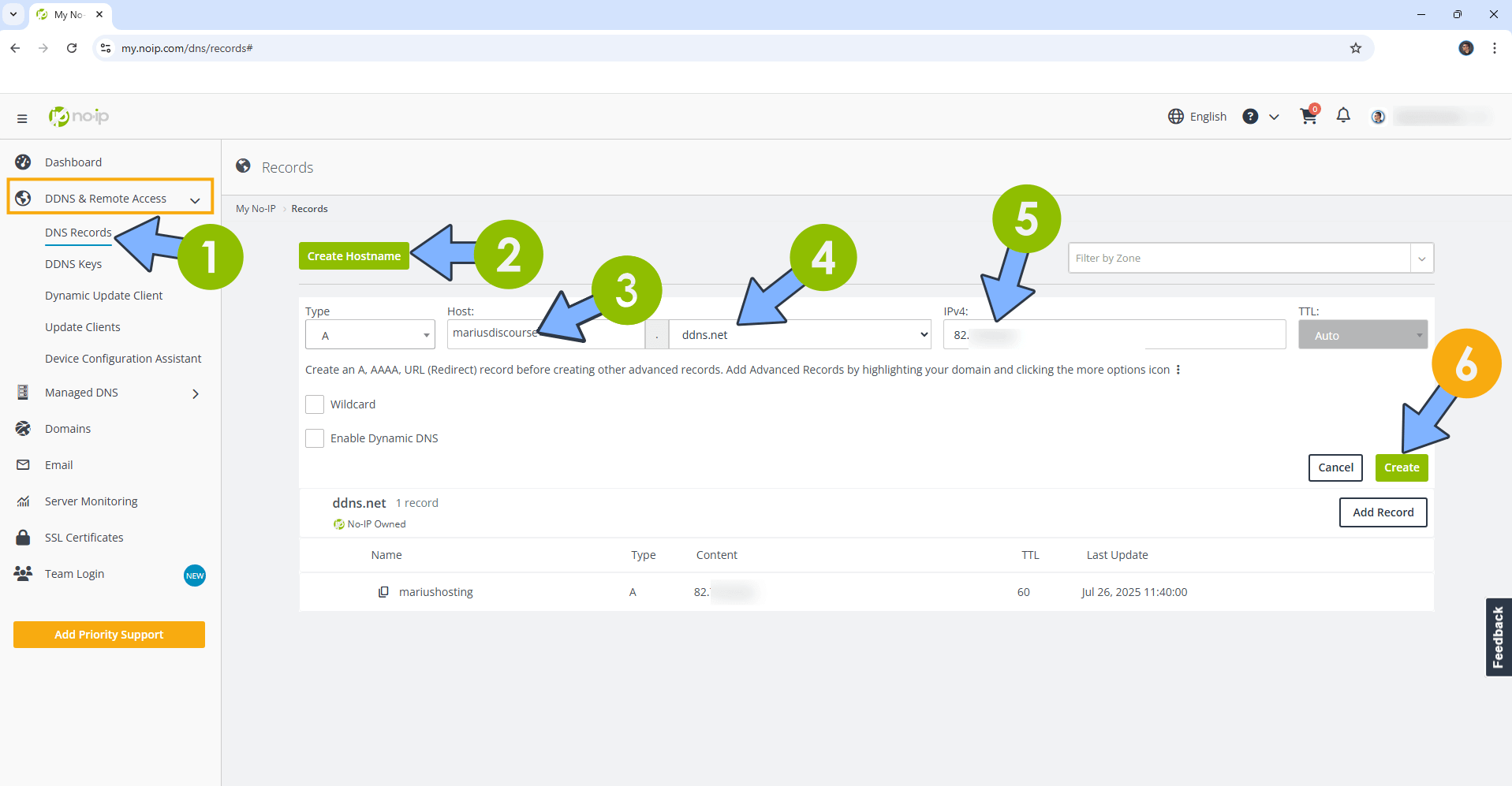
STEP 5
Go to Files and open the docker folder. Inside the docker folder, create one new folder and name it discourse. Follow the instructions in the image below.
Note: Be careful to enter only lowercase, not uppercase letters.
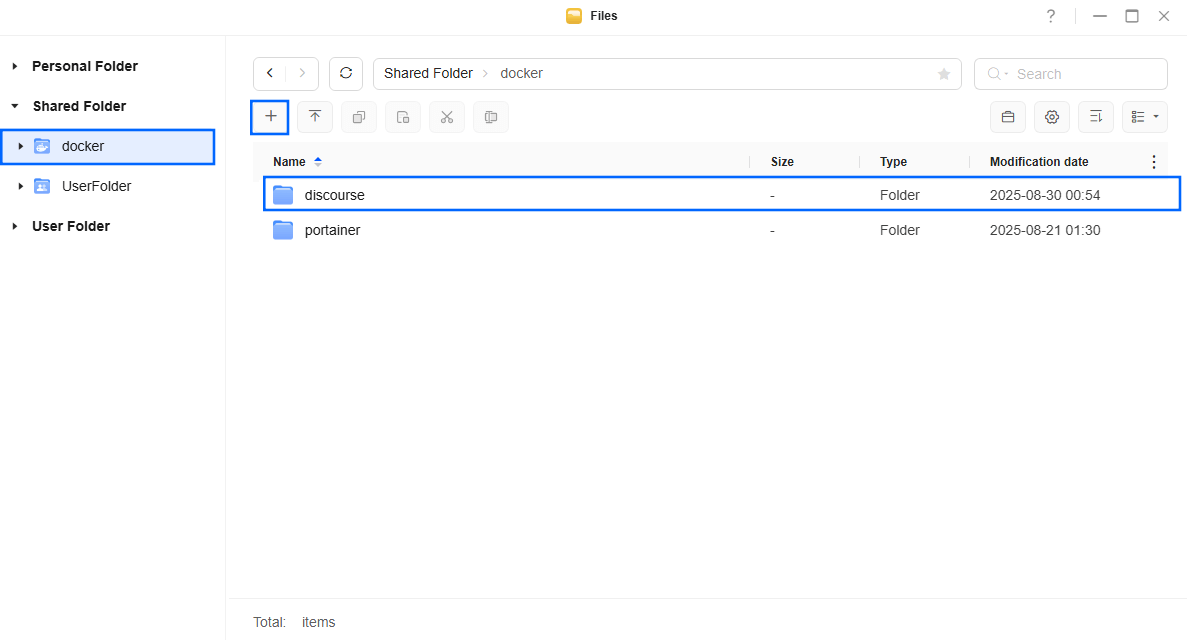
STEP 6
Now create four new folders inside the discourse folder that you created at STEP 5 and name them data, db, redis, sidekiq. Follow the instructions in the image below.
Note: Be careful to enter only lowercase, not uppercase letters.
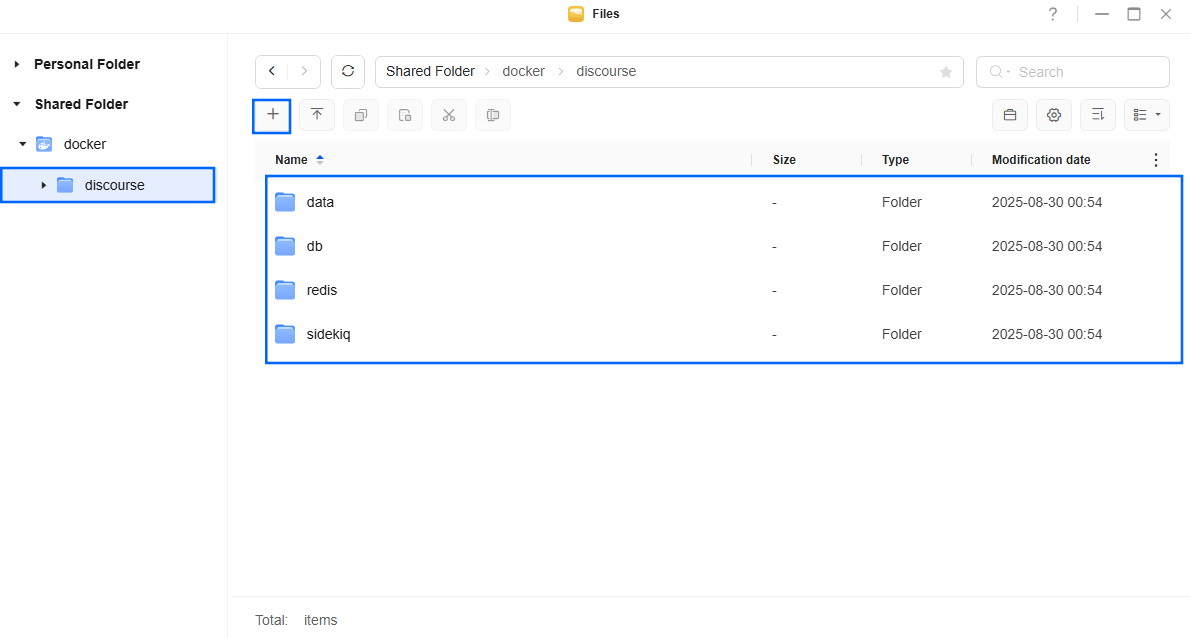
STEP 7
Follow my step by step guide on how to activate SMTP for your Gmail account. This step is mandatory. Note: If you don’t want to use the easiest way for SMTP with Google and you already have SMTP details from your own Mail Server, you can just skip this STEP and use your personalized email SMTP details instead.
STEP 8
Log into Portainer using your username and password. On the left sidebar in Portainer, click on Home then Live connect. Follow the instructions in the image below.

On the left sidebar in Portainer, click on Stacks then + Add stack. Follow the instructions in the image below.

STEP 9
In the Name field type in discourse. Follow the instructions in the image below.
services:
postgresql:
image: pgvector/pgvector:pg16
container_name: Discourse-DB
hostname: postgresql
security_opt:
- no-new-privileges:true
healthcheck:
test: ["CMD", "pg_isready", "-q", "-d", "bitnami_discourse", "-U", "postgres"]
timeout: 45s
interval: 10s
retries: 10
volumes:
- /volume1/docker/discourse/db:/var/lib/postgresql/data:rw
environment:
POSTGRES_DB: bitnami_discourse
POSTGRES_USER: postgres
POSTGRES_PASSWORD: bitnami123
restart: on-failure:5
redis:
image: redis
container_name: Discourse-REDIS
command: redis-server --requirepass redispass
healthcheck:
test: ["CMD-SHELL", "redis-cli ping || exit 1"]
volumes:
- /volume1/docker/discourse/redis:/data:rw
environment:
TZ: Europe/Bucharest
restart: on-failure:5
discourse:
image: bitnamilegacy/discourse:3.5.0
container_name: Discourse
user: 0:0
restart: on-failure:5
healthcheck:
test: timeout 10s bash -c ':> /dev/tcp/127.0.0.1/3000' || exit 1
interval: 10s
timeout: 5s
retries: 3
start_period: 90s
ports:
- 2249:3000
depends_on:
- postgresql
- redis
environment:
- DISCOURSE_USERNAME=marius1984 #Username should be a minimum of 10 carachters.
- DISCOURSE_PASSWORD=mariushosting10 #Password should be a minimum of 15 carachters.
- DISCOURSE_EMAIL=yourown@email
- DISCOURSE_ENV=production
- DISCOURSE_ENABLE_HTTPS=yes
- DISCOURSE_DATABASE_HOST=postgresql
- DISCOURSE_DATABASE_PORT_NUMBER=5432
- DISCOURSE_DATABASE_USER=postgres
- DISCOURSE_DATABASE_NAME=bitnami_discourse
- DISCOURSE_DATABASE_PASSWORD=bitnami123
- DISCOURSE_REDIS_HOST=redis
- DISCOURSE_REDIS_PORT_NUMBER=6379
- DISCOURSE_REDIS_PASSWORD=redispass
- POSTGRESQL_CLIENT_POSTGRES_USER=postgres
- POSTGRESQL_CLIENT_POSTGRES_PASSWORD=bitnami123
- POSTGRESQL_CLIENT_CREATE_DATABASE_NAME=bitnami_discourse
- POSTGRESQL_CLIENT_CREATE_DATABASE_EXTENSIONS=hstore,pg_trgm
- DISCOURSE_HOST=mariusdiscourse.ddns.net
- DISCOURSE_DEVELOPER_EMAILS=yourown@email
- DISCOURSE_SMTP_HOST=smtp.gmail.com
- DISCOURSE_SMTP_AUTH=login
- DISCOURSE_SMTP_PORT_NUMBER=587
- DISCOURSE_SMTP_USER=Your-own-gmail-address
- DISCOURSE_SMTP_PASSWORD=Your-own-app-password
- DISCOURSE_SMTP_PROTOCOL=tls
- BITNAMI_DEBUG=true
volumes:
- /volume1/docker/discourse/data:/bitnami/discourse:rw
sidekiq:
image: bitnamilegacy/discourse:3.5.0
container_name: Discourse-SIDEKIQ
user: 0:0
depends_on:
- discourse
volumes:
- /volume1/docker/discourse/sidekiq:/bitnami/discourse:rw
command: /opt/bitnami/scripts/discourse-sidekiq/run.sh
environment:
- DISCOURSE_USERNAME=marius1984 #Username should be a minimum of 10 carachters.
- DISCOURSE_PASSWORD=mariushosting10 #Password should be a minimum of 15 carachters.
- DISCOURSE_HOST=mariusdiscourse.ddns.net
- DISCOURSE_ENABLE_HTTPS=yes
- DISCOURSE_ENV=production
- DISCOURSE_DATABASE_HOST=postgresql
- DISCOURSE_DATABASE_PORT_NUMBER=5432
- DISCOURSE_DATABASE_USER=postgres
- DISCOURSE_DATABASE_NAME=bitnami_discourse
- DISCOURSE_DATABASE_PASSWORD=bitnami123
- DISCOURSE_REDIS_HOST=redis
- DISCOURSE_REDIS_PORT_NUMBER=6379
- DISCOURSE_REDIS_PASSWORD=redispass
- DISCOURSE_DEVELOPER_EMAILS=yourown@email
- DISCOURSE_SMTP_HOST=smtp.gmail.com
- DISCOURSE_SMTP_AUTH=login
- DISCOURSE_SMTP_PORT_NUMBER=587
- DISCOURSE_SMTP_USER=Your-own-gmail-address
- DISCOURSE_SMTP_PASSWORD=Your-own-app-password
- DISCOURSE_SMTP_PROTOCOL=tls
- BITNAMI_DEBUG=true
Note: Before you paste the code above in the Web editor area below, change the value for TZ. (Select your current Time Zone from this list.)
Note: Before you paste the code above in the Web editor area below, change the value for DISCOURSE_USERNAME. Type in your own username. marius1984 is an example for a username.
Note: Before you paste the code above in the Web editor area below, change the value for DISCOURSE_PASSWORD. Type in your own password. mariushosting10 is an example for a password. You will need this password later at STEP 17.
Note: Before you paste the code above in the Web editor area below, change the value for DISCOURSE_EMAIL. Type in your own email address. You will need this email later at STEP 17.
Note: Before you paste the code above in the Web editor area below, change the value for DISCOURSE_HOST and type in your own NO IP DDNS address without https:// at the beginning that you have previously created at STEP 4.
Note: Before you paste the code above in the Web editor area below, change the value for DISCOURSE_DEVELOPER_EMAILS. Type in your own email address. You will need this email address at STEP 17.
Note: Before you paste the code above in the Web editor area below, change the value for DISCOURSE_SMTP_USER and type in your own Gmail address. Refer to STEP 7.
Note: Before you paste the code above in the Web editor area below, change the value for DISCOURSE_SMTP_PASSWORD and type in your own Gmail app password. Refer to STEP 7.
Note: Before you paste the code above in the Web editor area below, change the value for DISCOURSE_HOST and type in your own NO IP DDNS without https:// at the beginning that you have previously created at STEP 4.
Note: Before you paste the code above in the Web editor area below, change the value for DISCOURSE_DEVELOPER_EMAILS. Type in your own email address. You will need this email address at STEP 17.
Note: Before you paste the code above in the Web editor area below, change the value for DISCOURSE_SMTP_USER and type in your own Gmail address. Refer to STEP 7.
Note: Before you paste the code above in the Web editor area below, change the value for DISCOURSE_SMTP_PASSWORD and type in your own Gmail app password. Refer to STEP 7.
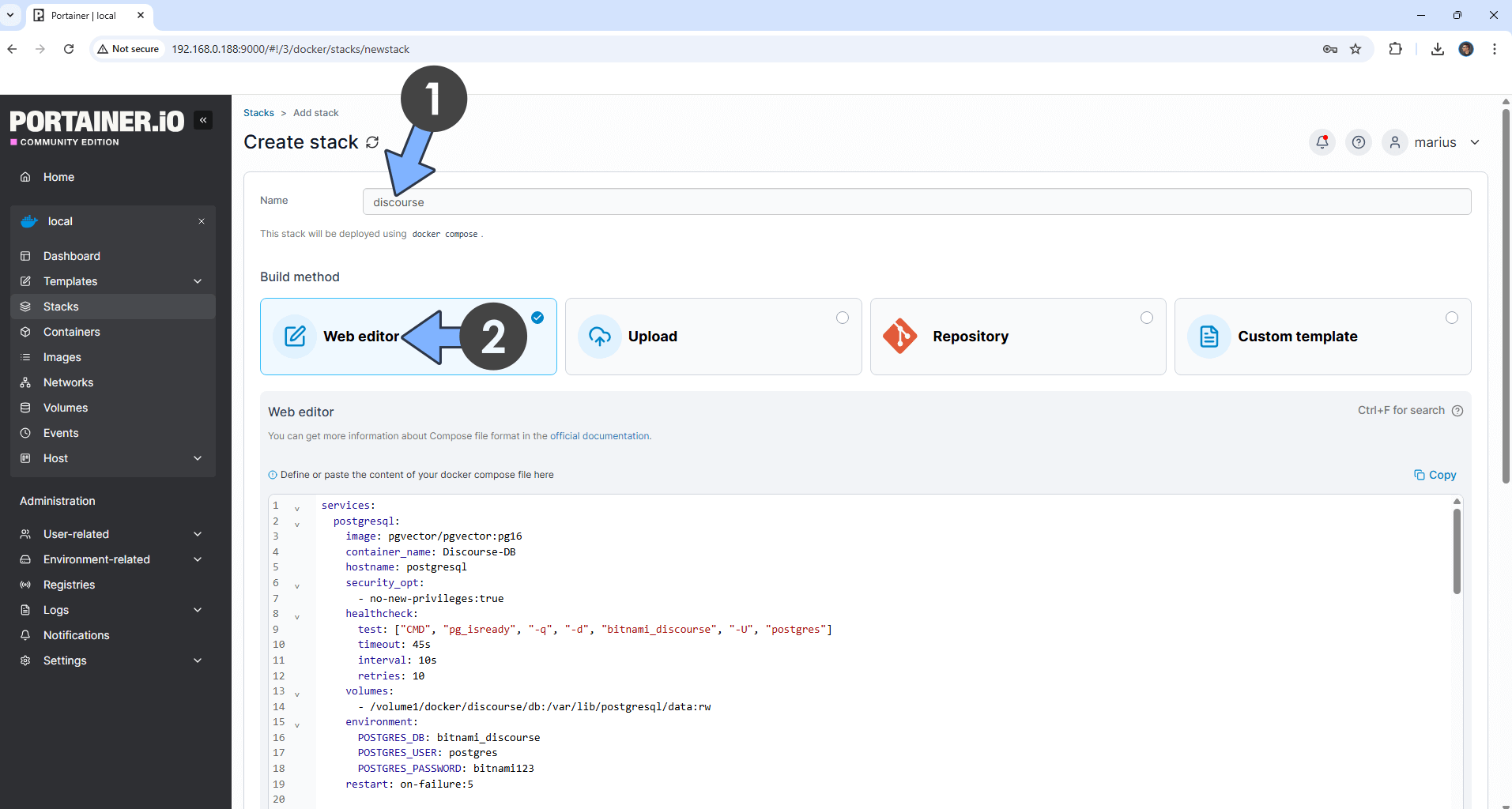
STEP 10
Scroll down on the page until you see a button named Deploy the stack. Click on it. Follow the instructions in the image below. The installation process can take up to a few minutes. It will depend on your Internet speed connection.
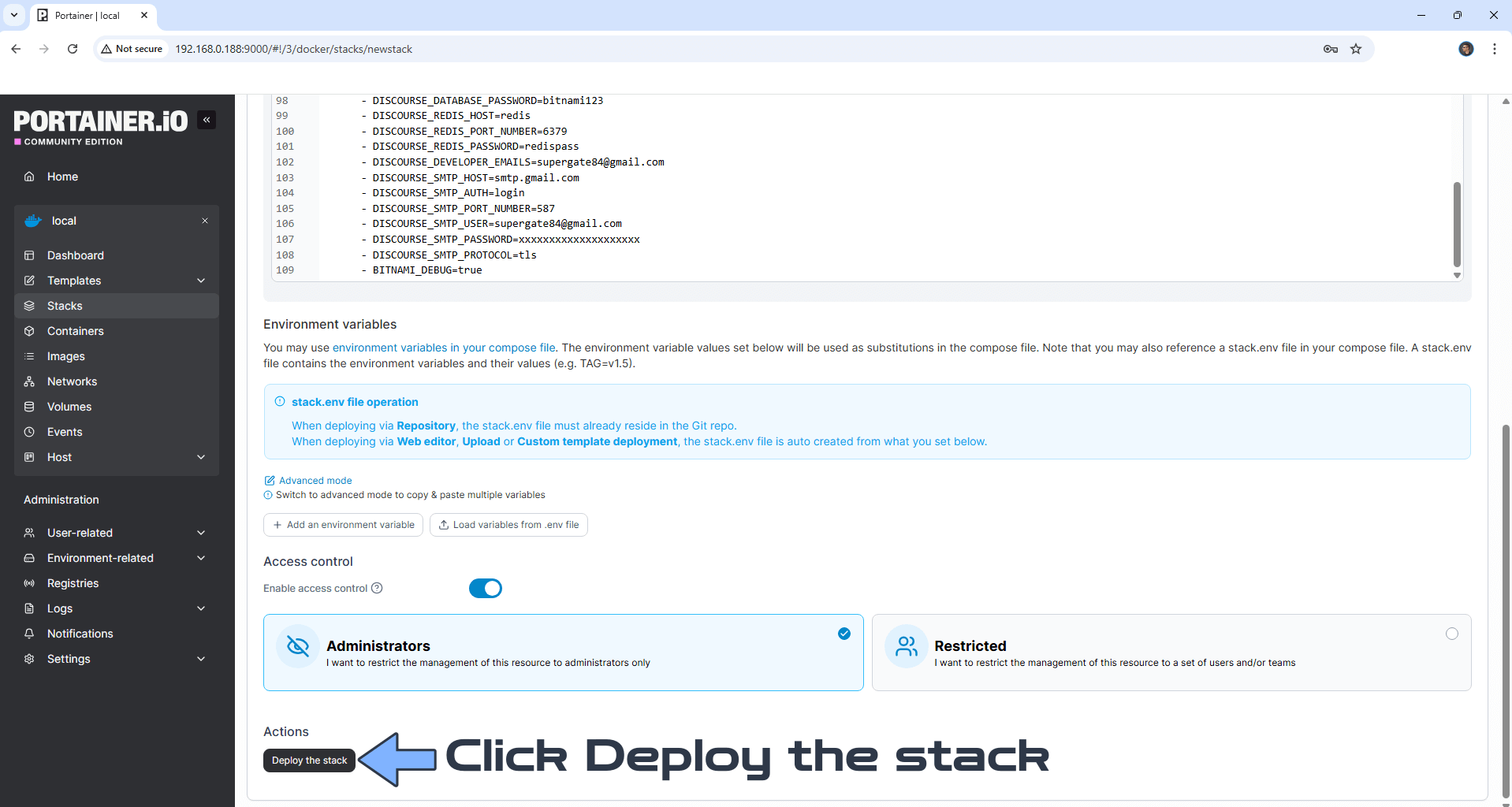
STEP 11
If everything goes right, you will see the following message at the top right of your screen: “Success Stack successfully deployed“.

STEP 12
Open your Nginx Proxy Manager container that you have previously installed at STEP 3. Click Add Proxy Host. A new pop up window will open. Add the following details:
Domain Names: Type in your own noip domain name that you have previously created at STEP 4.
Scheme: http
Forward Hostname/IP: Type in the local NAS IP of your UGREEN NAS.
Forward Port: Type in the Discourse local Port that is 2249
Check Block Common Exploits
Check Websockets Support
Click the SSL tab. Follow the instructions in the image below.
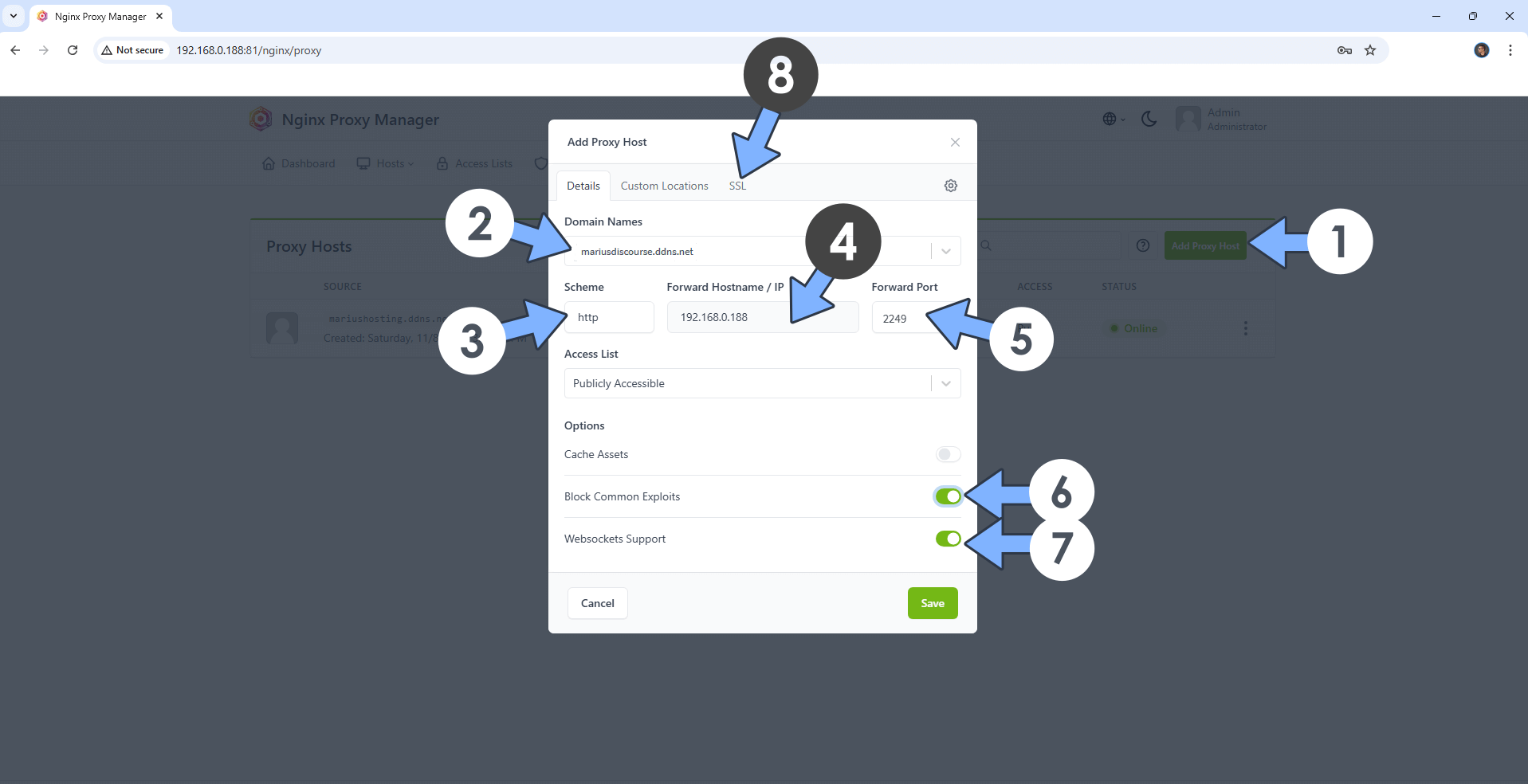
STEP 13
After you click the SSL tab, add the following details:
SSL Certificate: Request a new SSL Certificate
Check: Force SSL
Check: HSTS Enabled
Check: HTTP/2 Support
Click Save. Follow the instructions in the image below.
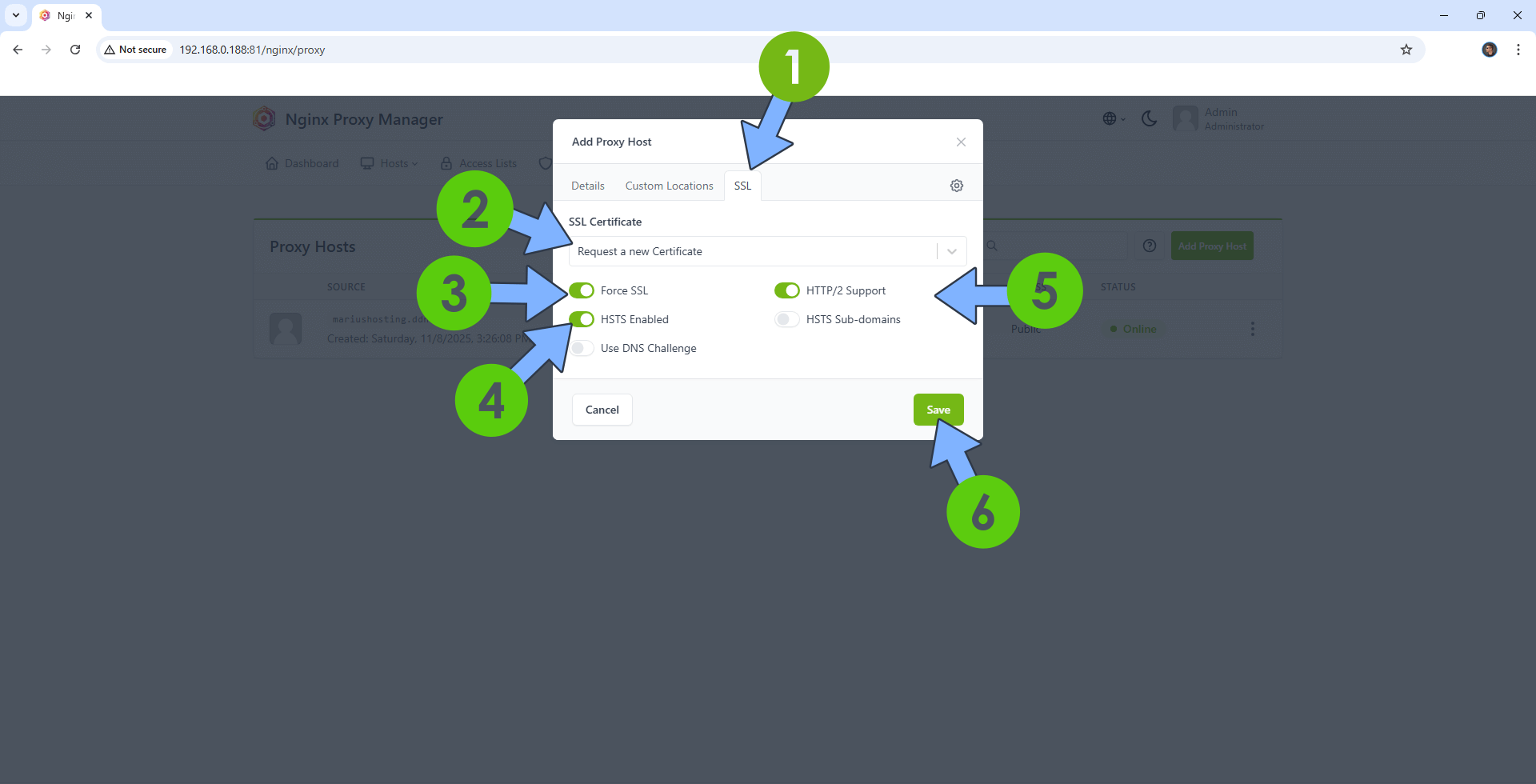
STEP 14
In the Proxy Hosts area, if everything goes right, you will see that your discourse hostname has been generated. Click on it. Follow the instructions in the image below.
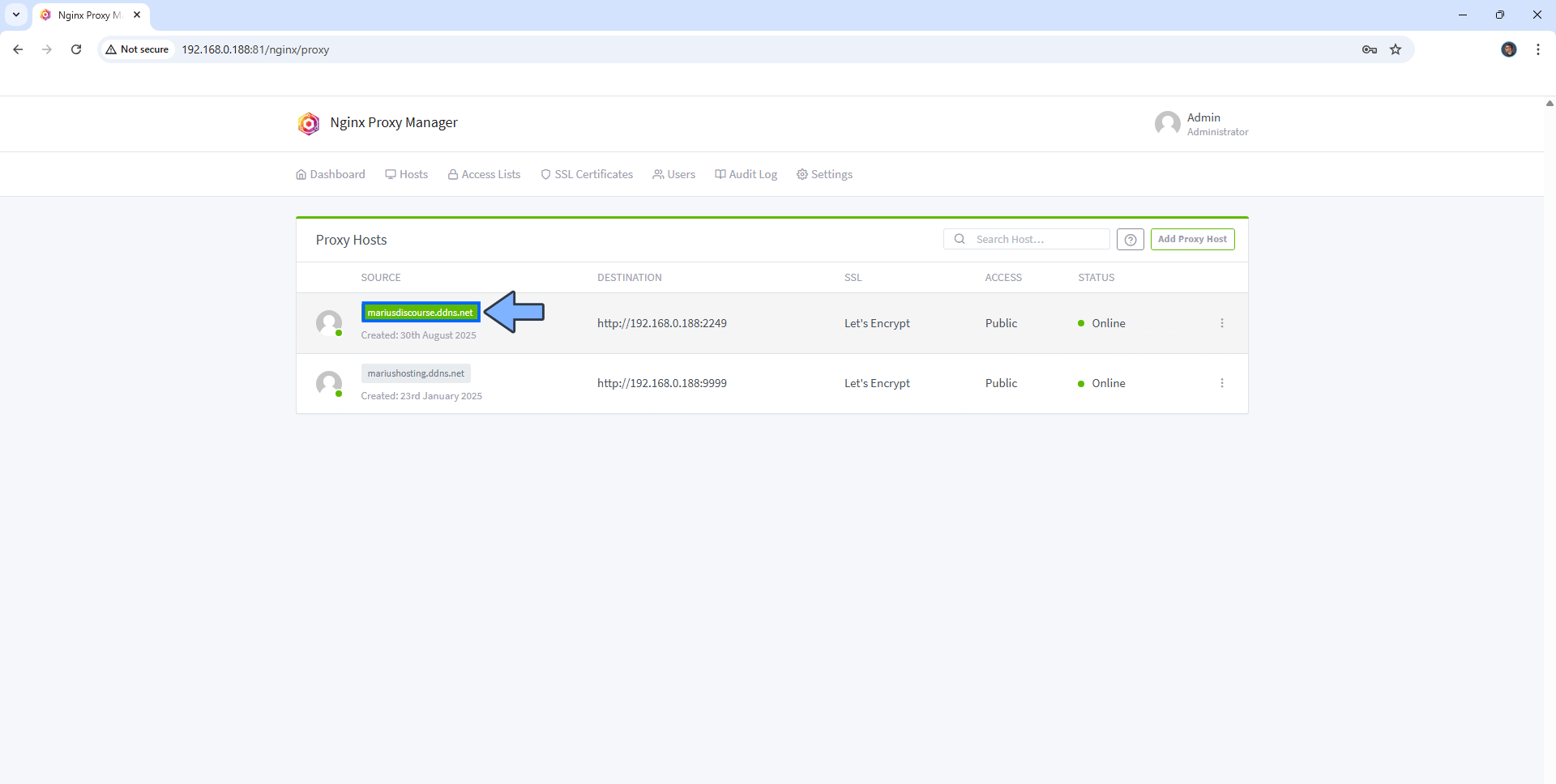
STEP 15
🟢Please Support My work by Making a Donation. Almost 99,9% of the people that install something using my guides forget to support my work, or just ignore STEP 1. I’ve been very honest about this aspect of my work since the beginning: I don’t run any ADS, I don’t require subscriptions, paid or otherwise, I don’t collect IPs, emails, and I don’t have any referral links from Amazon or other merchants. I also don’t have any POP-UPs or COOKIES. I have repeatedly been told over the years how much I have contributed to the community. It’s something I love doing and have been honest about my passion since the beginning. But I also Need The Community to Support me Back to be able to continue doing this work.
STEP 16
Please wait approximately 5 minutes for the installation to be completed or you will get a blank error page if you try to connect too soon. Now open your browser and type in your HTTPS/SSL certificate like this https://yourname.ddns.net In my case it’s https://mariusdiscourse.ddns.net If everything goes right, you will see the main Discourse login page. Click Log in. Follow the instructions in the image below.
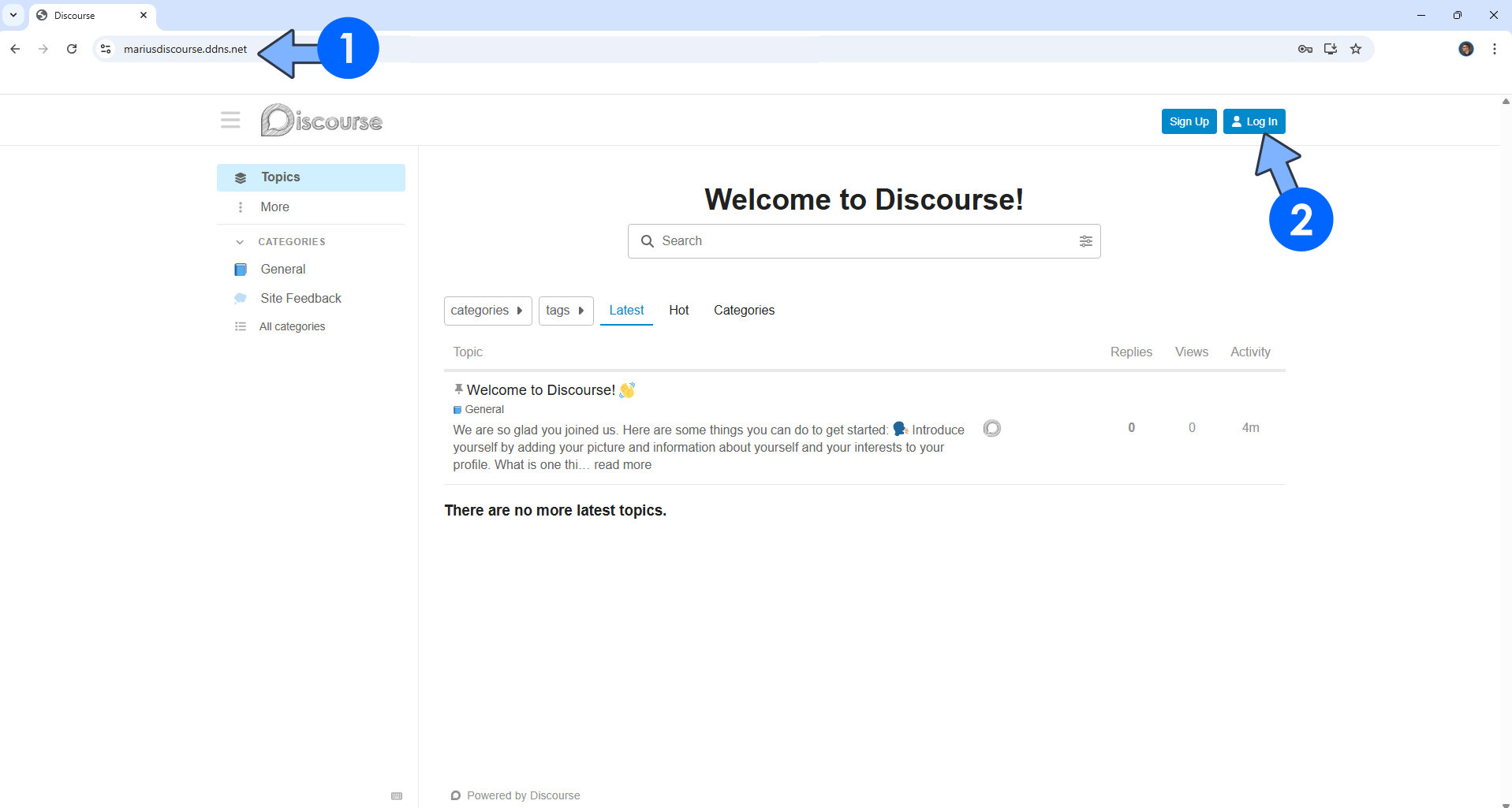
STEP 17
A new pop up window will open. Type in your own Email Address (DISCOURSE_EMAIL) and your own Password (DISCOURSE_PASSWORD) that you have previously added at STEP 9, then click Log in. Follow the instructions in the image below.
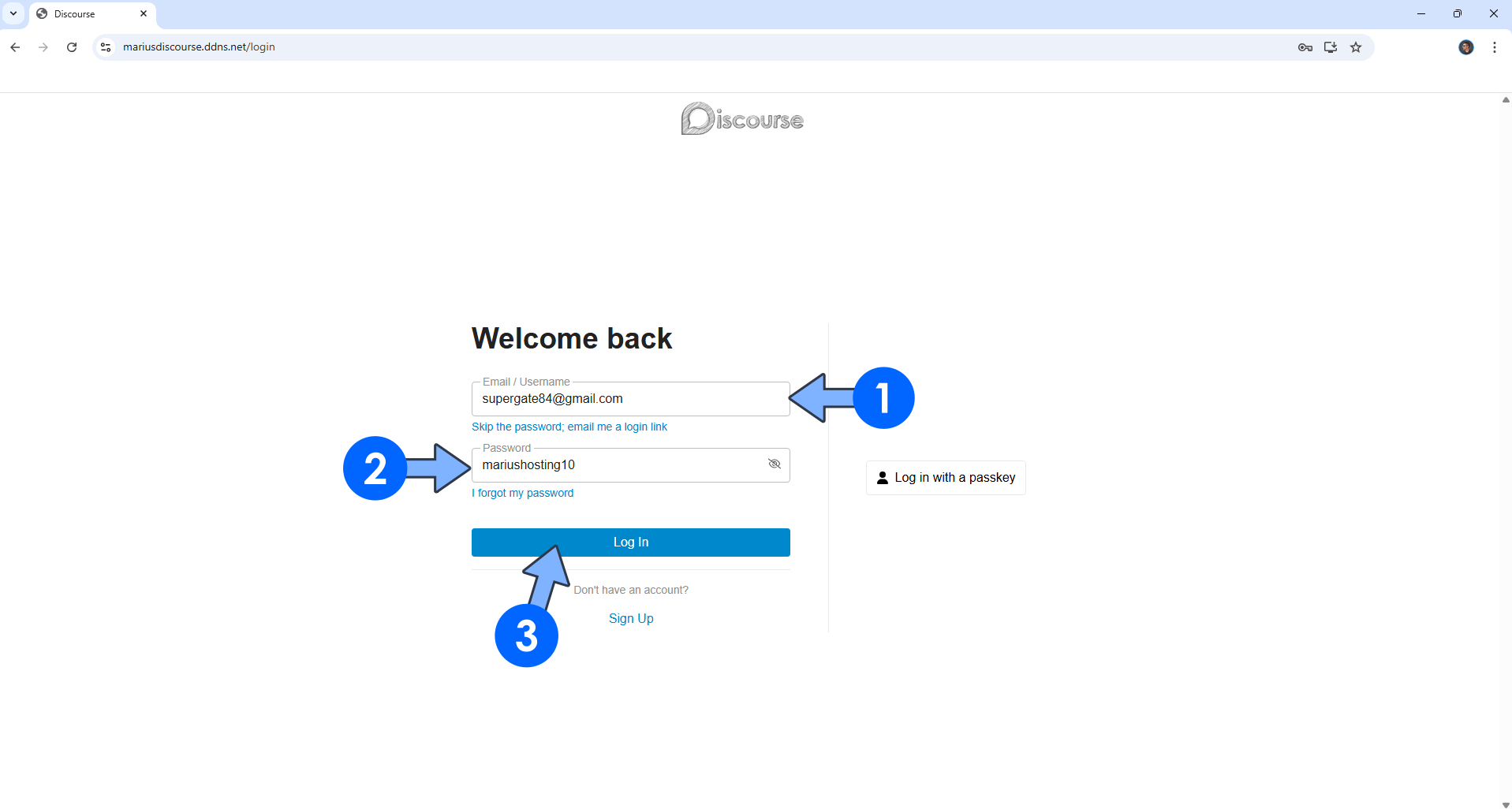
STEP 18
On the left Discourse sidebar, click Admin. Follow the instructions in the image below.
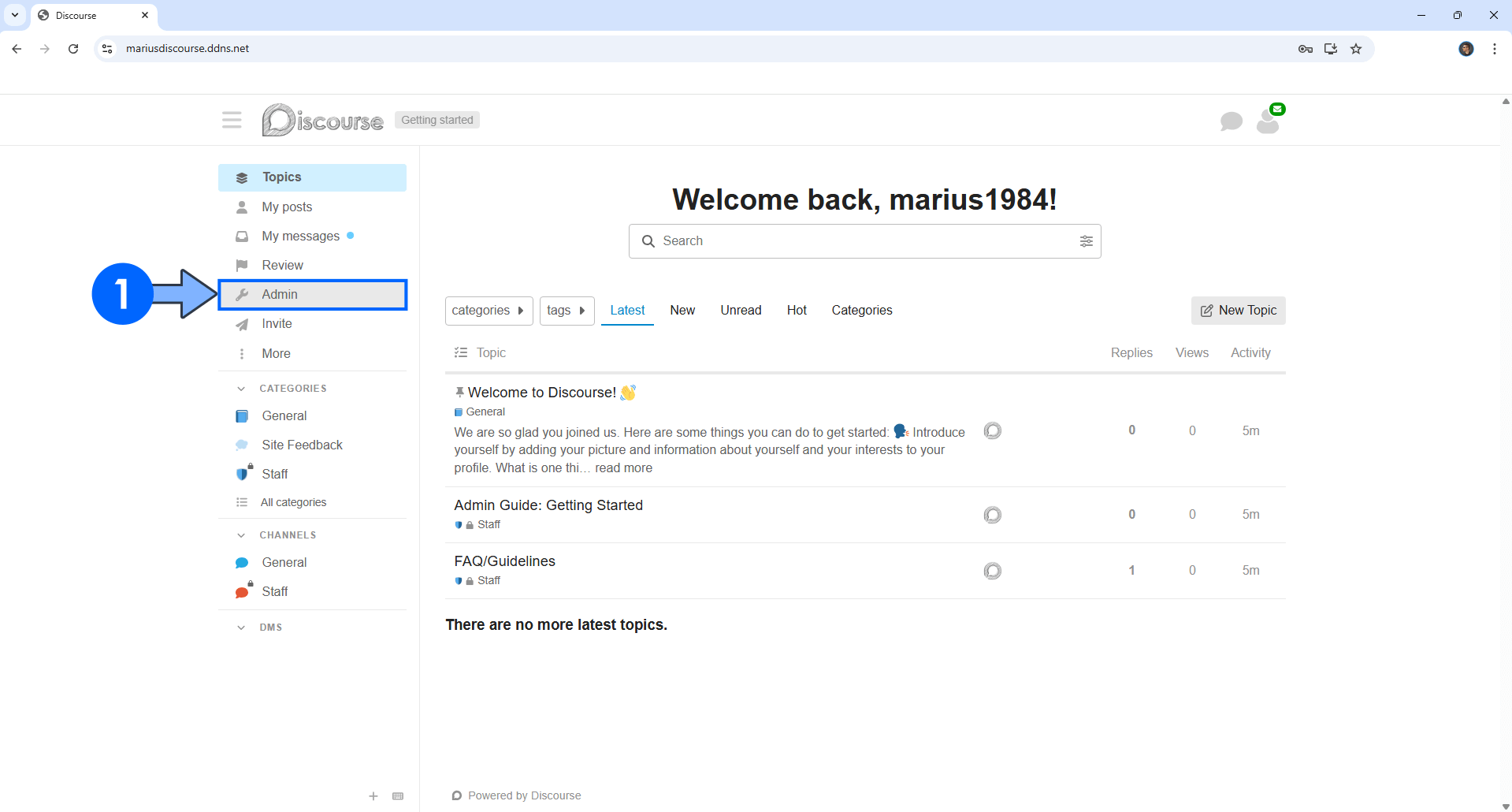
STEP 19
Click Security. Check the Force HTTPS option, then confirm it. Follow the instructions in the image below.
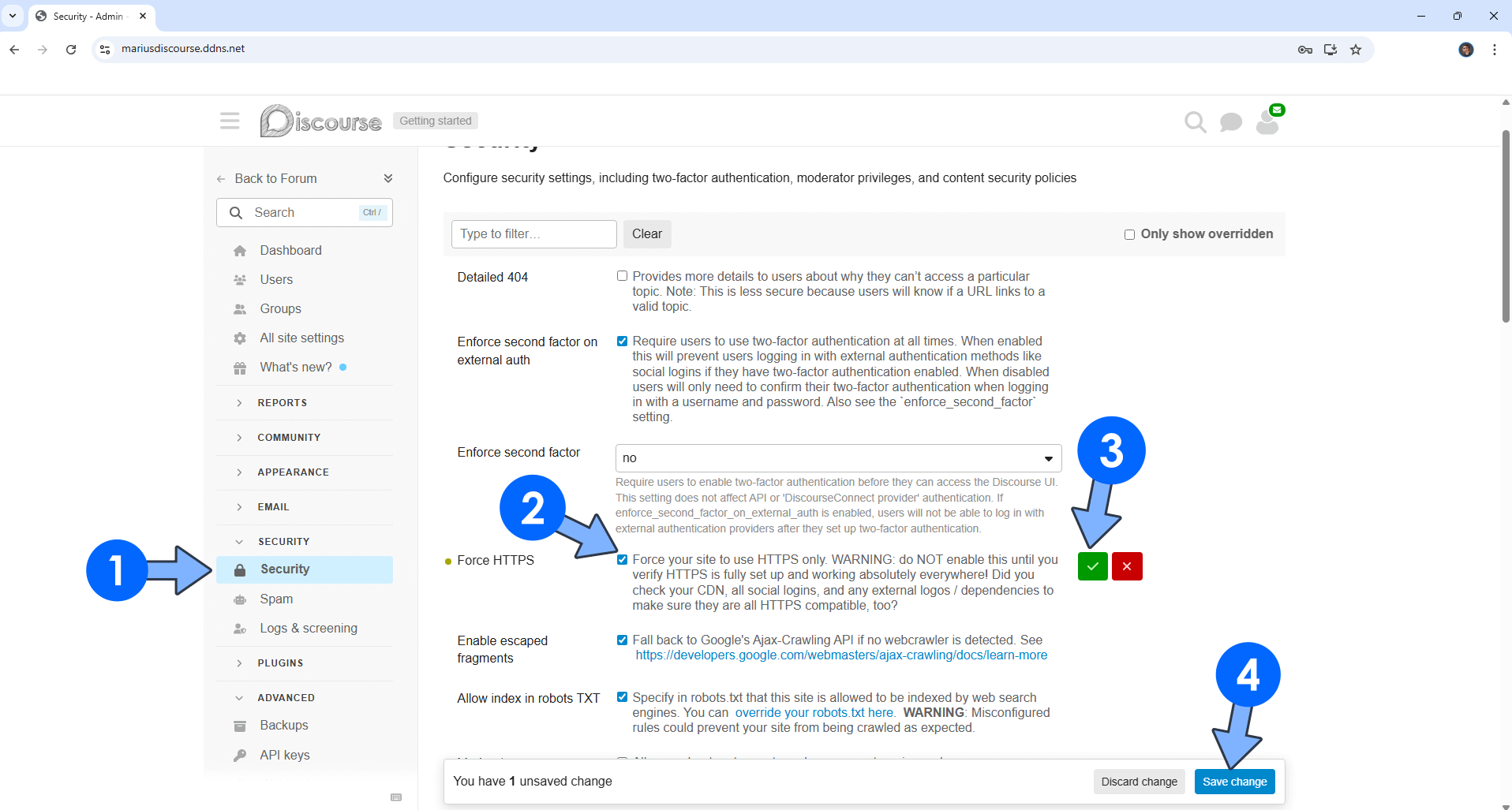
STEP 20
Your Discourse forum at a glance!
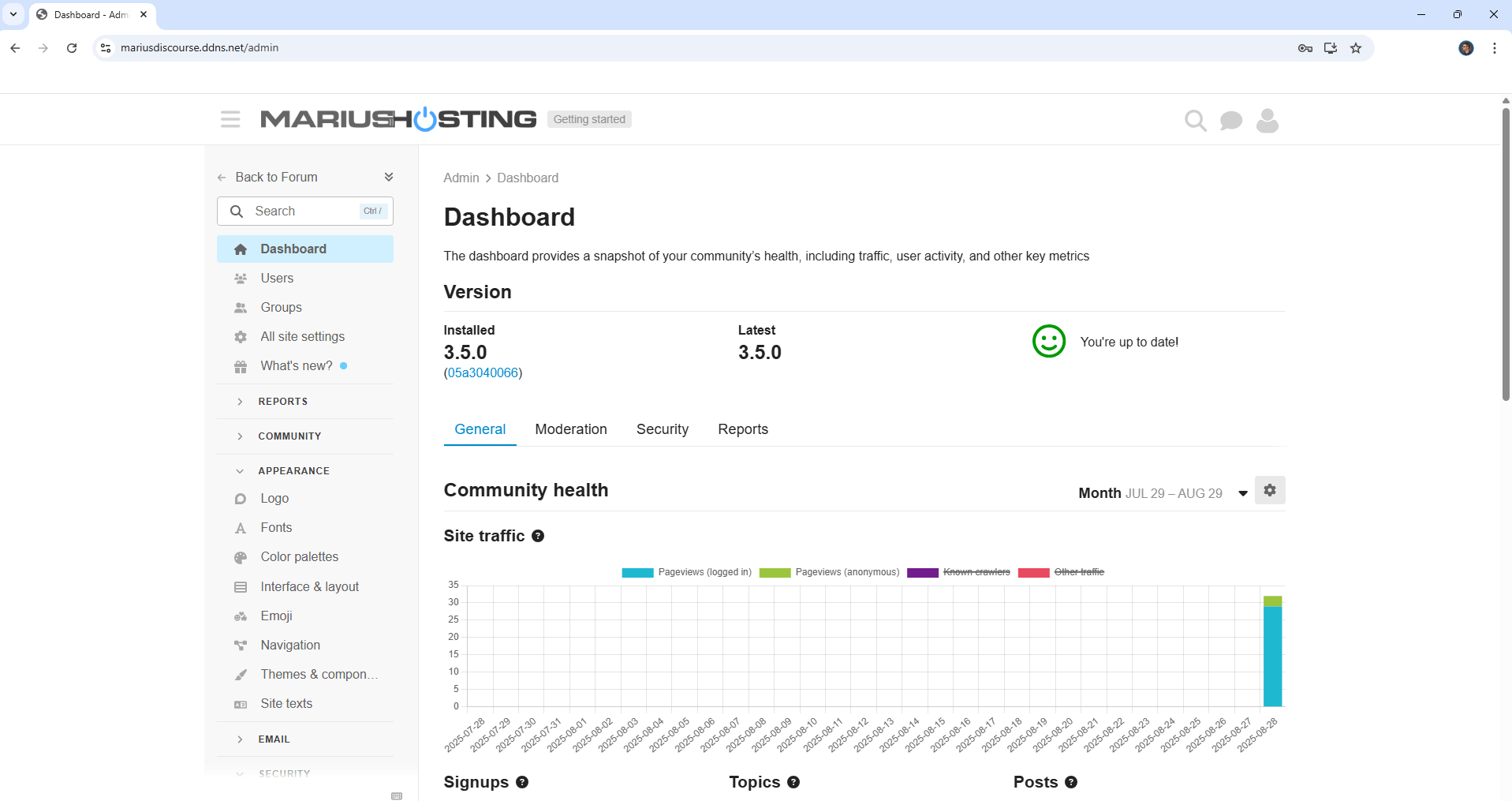
Add your first post!
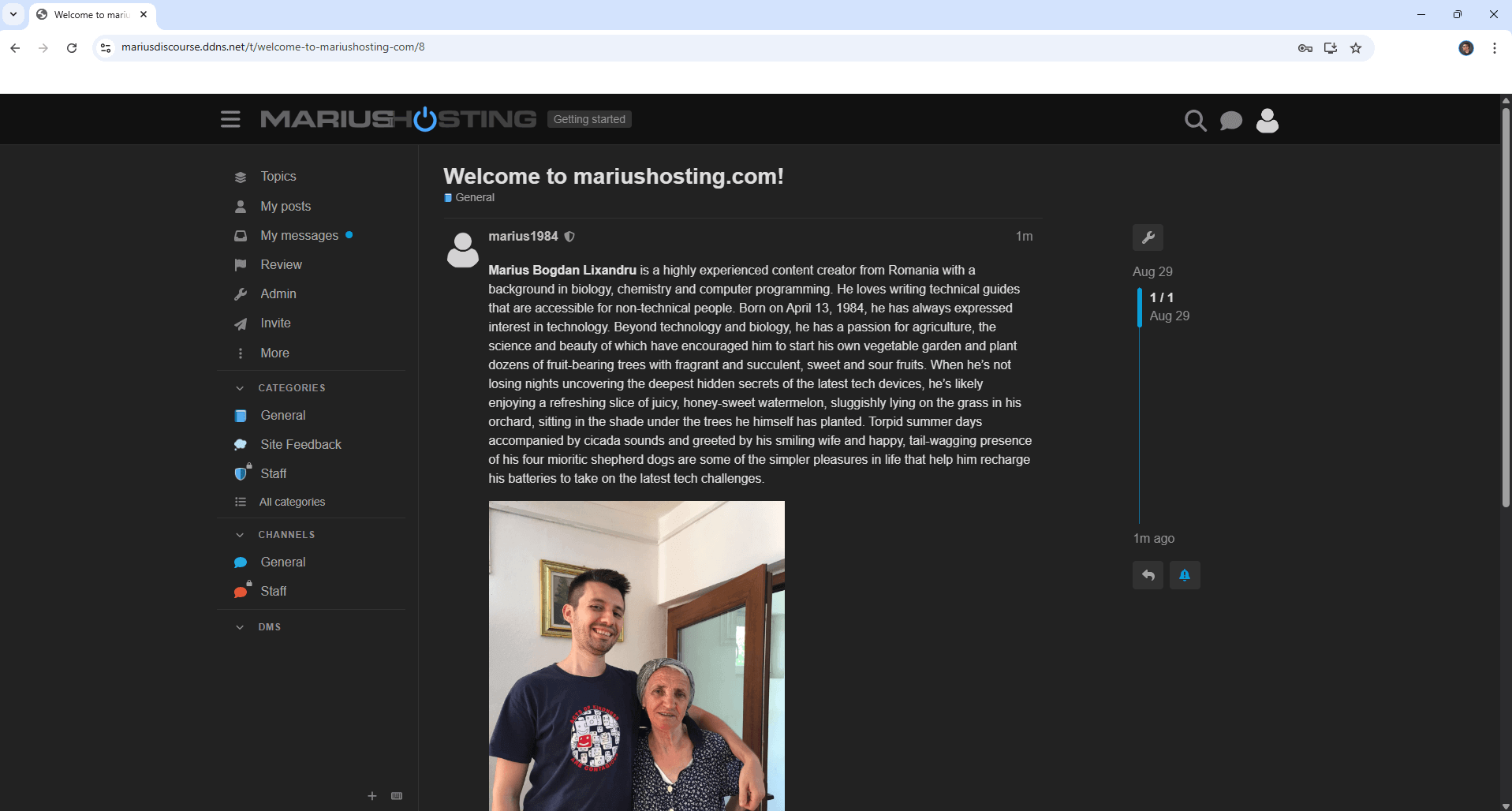
Enjoy Discourse on your UGREEEN NAS!
🆙Note/Update/Container: How to Update Your Docker Containers on UGREEN NAS Using Portainer.
🐳Note: How to Create Docker Shortcuts on Desktop.
🆕Note: How to Update Portainer to the latest version.
🆕Note: How to Clean Docker.
This post was updated on Thursday / January 1st, 2026 at 6:58 PM
